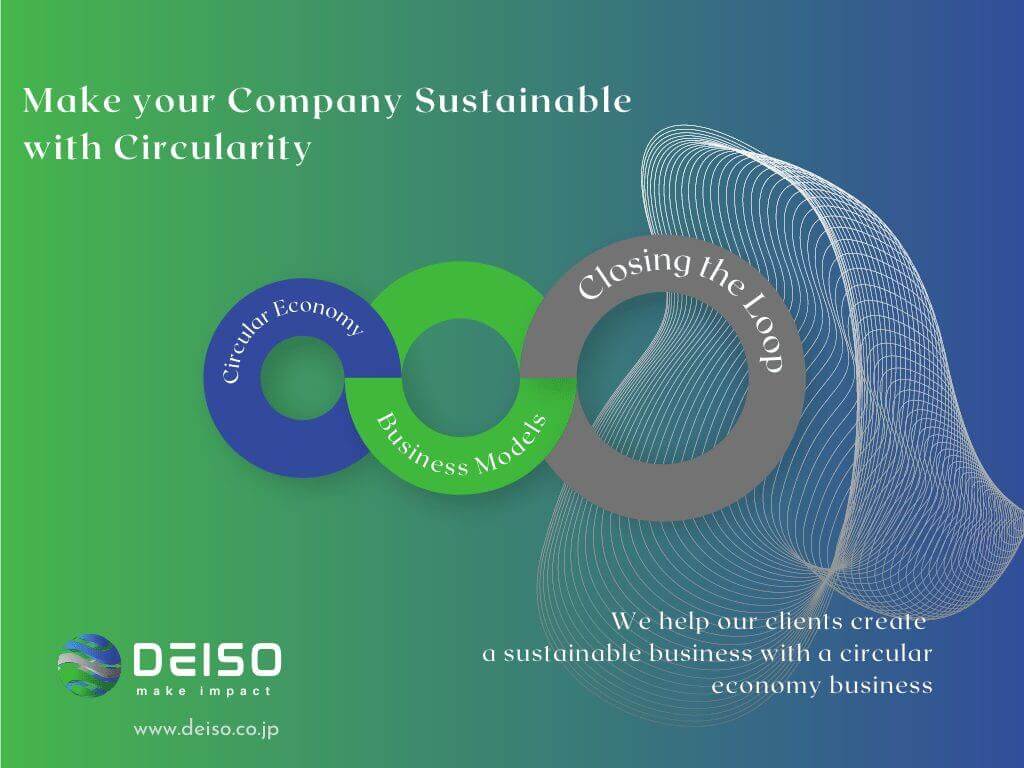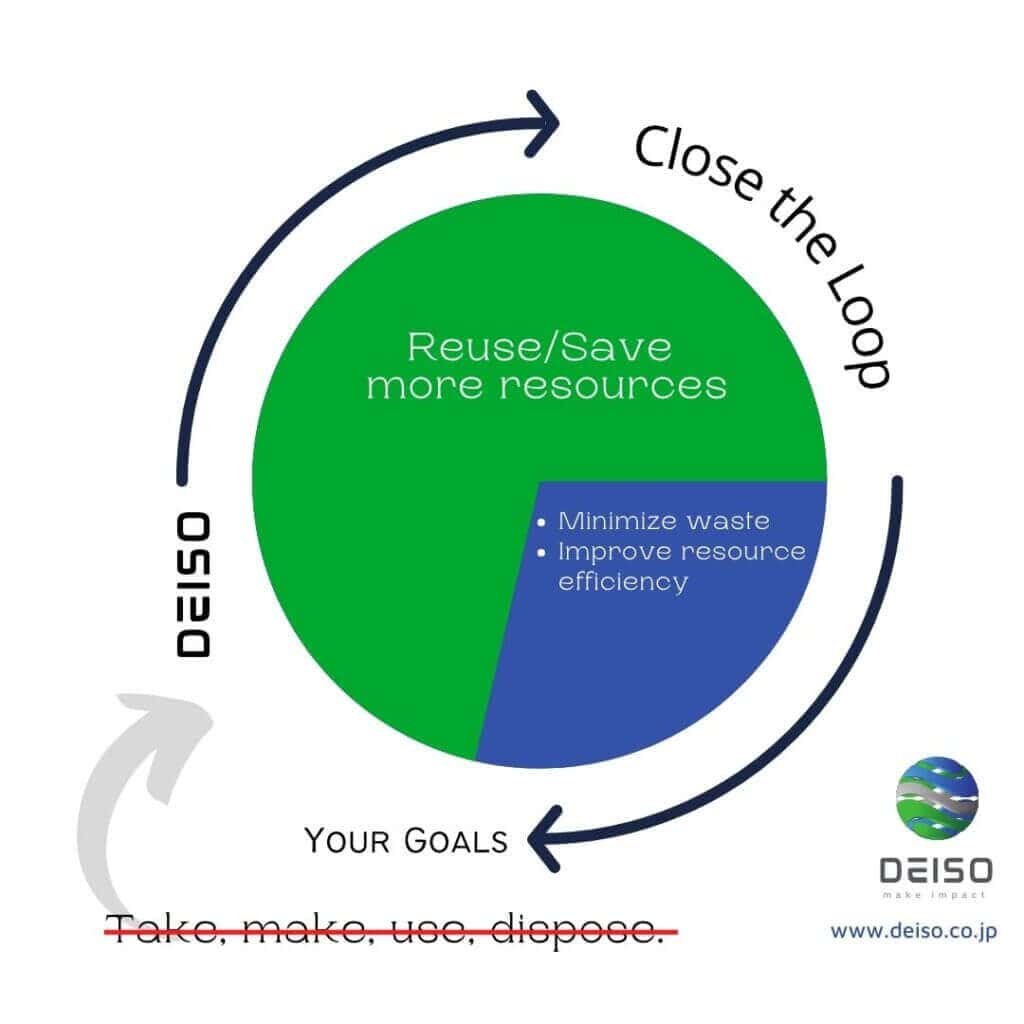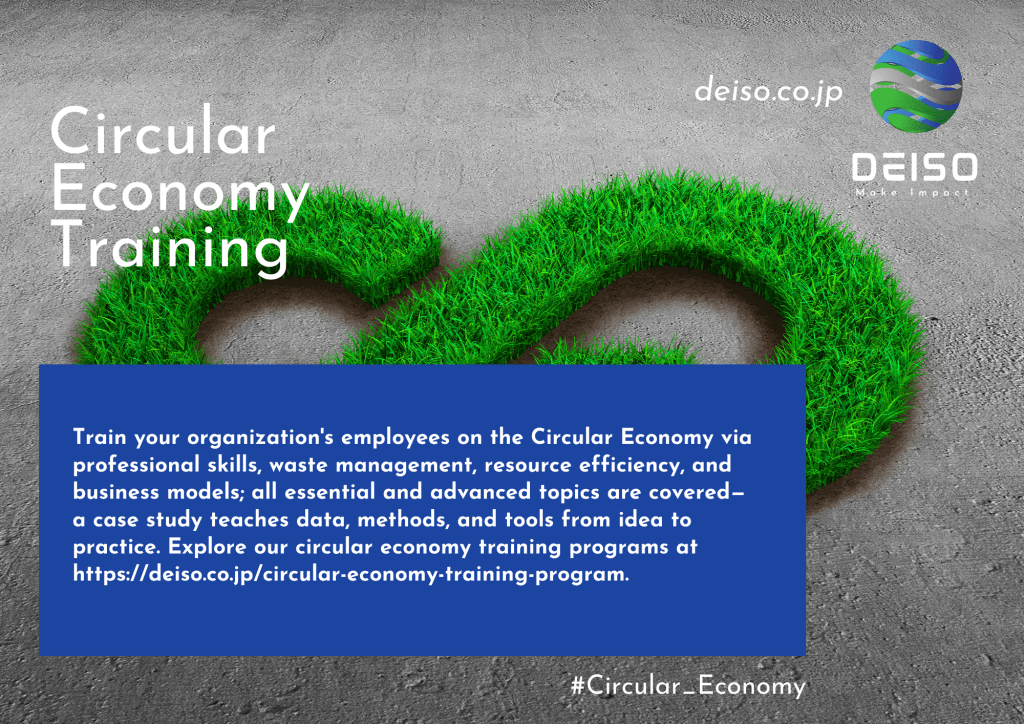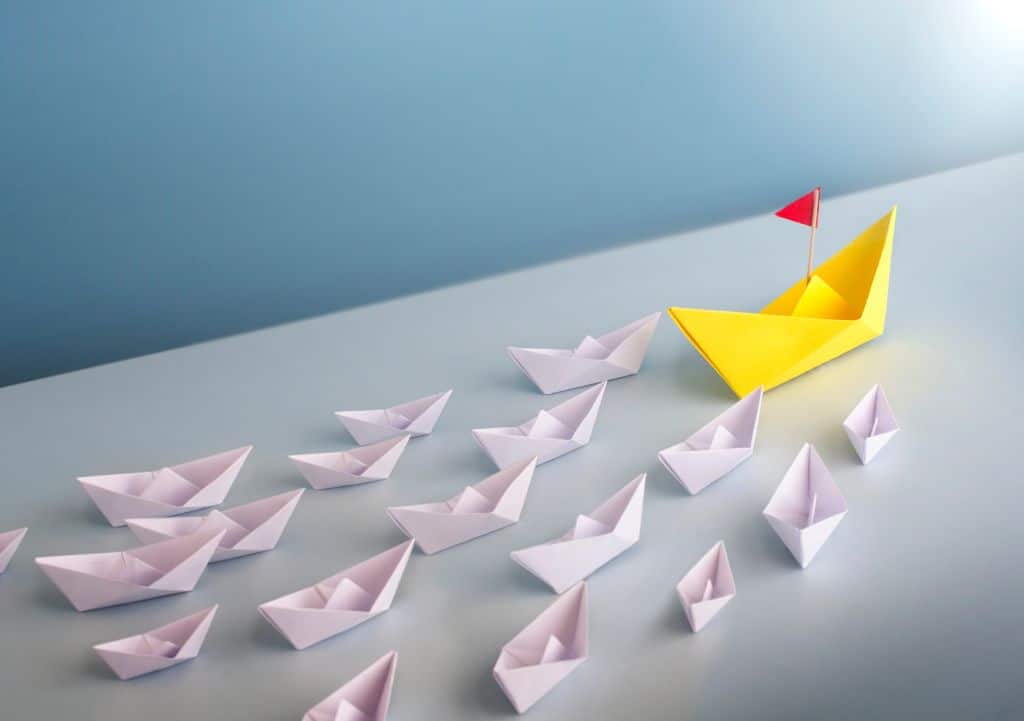-A path to circularity, impact, and corporate values.
From a linear to a circular economy, sustainably through data, consulting, and evaluation.
Circular Economy Services
The circular economy is a sustainable alternative to our traditional linear economy. In a circular economy, waste is minimized, and resources are conserved. This reduces environmental pollution and saves companies money by conserving resources. In a circular economy, waste is a resource that businesses need to reuse, recycle, or lower. At DEISO, we help our clients identify the hotspots, risks, potentials, and benefits, rethink product design, and find new opportunities to reuse and recycle materials. Businesses can become more efficient by looking at the entire supply chain and the life cycle of products with a holistic approach. At DEISO, we support companies achieving sustainable growth and becoming circular through 11 services as follows:
- Innovative business models and ecosystems.
- Creation of a circular economy strategy: a strategy that aligns with your business ambitions – from ambitions to actions.
- Capacity-building schemes services: human resource development of companies for the circular economy.
- Developing concepts and evaluating service business models of product-as-a-service (PaaS).
- Waste management utilization and resource efficiency.
- Development of innovative business models: enhancing production efficiency.
- Development and evaluation of digital circular business models concepts: software-as-a-service (SaaS).
- Life cycle assessment and reporting on GHG and carbon footprint.
- Development of temporal circularity indicator (MCI): measuring the progress.
- Corporate reporting for the circular economy.
- Circular economy acceleration service: technical evaluations of startups acquisition.
Scope 3 considers other emissions generated by the organization when fossil fuels are burned in their value chain. Including upstream – e.g., goods and services purchased into an organization to manufacture goods or services. Also included is what happens downstream – for example, after a product is sold and used by customers.
The three Scopes categorize these emissions in the Greenhouse Gas Protocol (GHG).
- Scope 1: Direct emissions from a company’s sources.
- Scope 2: Indirect emissions of energy purchased to operate (electricity, heating, & cooling).
- Scope 3: All other indirect emissions from the value chain, upstream and downstream. Cover everything from purchased goods and raw materials, business travel and employee commuting, operational waste, and End-of-Life (EoL) treatment.
Our Offering for Circular Economy Business
Collaborative Development of Innovative Business Models and Ecosystems
The shift to a circular economy requires system-wide innovation to dissociate (economic) growth from traditional resource consumption. The circular economy is not merely a set of principles: it defines concrete actions to respond to growing trends and needs. We are helping organizations operate in an era of systemic change.
One of the critical considerations is the concept of co-development in developing sustainable strategies and business cases. Here, DEISO’s sustainability expertise delivers added value to our customers. We support companies through their circular pathway. Our services range from developing a circular strategy to developing circular trading models buying through the measurement and steering of the circularity up to activating your supply chain through a program to improve the circularity of the products. To bring the circular ecosystem together.
Creation of a Circular Economy Strategy
A strategy that aligns with your business ambitions – from ambitions to actions
The strategic approach to the circular economy of DEISO provides a clear structure for companies that want to develop an attainable ambition. The approach consists of 3 models we will complete in close cooperation with the customer. For any transformation project, strategy is driving it, so it is essential to look at the ambition level, scope, short, mid, and long-term goals, and the business case.
Based on the client’s objectives, the project, and the collaboration level, we collaborate and discuss with our client the implementation of one approach:
- An original model is designed and developed specifically for our client.
- Modification of existing and successful model to adapt it to our client business of the best practices worldwide.
- Transformation of academic research results by analyzing several relevant research results.
Capacity-Building Schemes Services: Human Resource Development
DEISO helps its clients achieve their ambition and defined strategies by developing achievable implementation roadmaps for critical operational functions. These roadmaps demonstrate the necessary long-term actions required to achieve the objectives. To help our customers achieve this goal, we offer capacity-building programs for various stakeholder groups that can be developed or for the team within the company or across company departments. We provide human resources development programs that focus on theories, practices, technical competencies, and methods. They consist of training courses, seminars, and workshops.
Development of Innovative Business Models
A Product-as-a-Service business model (PaaS) and associated revenue models play a circular economy role. Revenue models include pay-per-use, rent, or lease. We help our customers create PaaS business models to implement or improve circularity within their organizations. This service assists pioneers and sustainable development leaders looking to test or expand their businesses.
Waste Management Utilization and Resource Efficiency: Enhancing Resource Efficiency
A rapidly expanding circular economy looks at waste management and its flow through manufacturing processes. In many countries, too many valuable materials are incinerated or put into a landfill instead of being reused. At DEISO, we conduct technical assessments and recommendations on waste (municipal, liquid, solid, e-waste, and hazardous). We highlight the hotspots for waste generation, waste reduction potentization potential, and waste management’s environmental impact and benefits throughout the life cycle.
Digital Circular Business Models: Software-as-a-service (SaaS)
Some customers are ready to choose a particular SaaS to manage their supply chain on the cloud. Others are ready to build themselves SaaS. At DEISO, we help our customers assess a candidate SaaS provider they are prepared to purchase their service. We evaluate the providers of interest from both the technical issues, weakness points, benefits for the circular economy, and the potential for implementation or improvement of the circularity of our customers with these SaaS solutions. Suppose the client wishes to build the company’s own SaaS or cloud-based solution. In that case, we help them in the planning, design, interface (back and front ends), the technical aspects of the platform, and the features for implementation. E collaborate with our customer’s development to build such platforms.
Developing digital platforms, which can contribute to the sharing economy, is one way several industrial countries, such as Japan, can establish themselves as a global frontrunner in the transition toward a circular economy.
Life Cycle Assessment (LCA) And Reporting on GHG And Carbon Footprint
Why Is It Essential in a Circular Economy?
DEISO regards LCA as a “language” and says we are fluent in LCA. We assess environmental issues (environmental burden) of production processes, technologies, or services throughout the life cycle. Some of our clients are only interested in the production processes (Gate-to-Gate). In contrast, others are interested in Gate-to Grave (end of life of the products or the waste phase). We do this within 3 scopes of GHG emissions and carbon neutrality (or accounting for GHGs) (Scope 1, Scope 3, or Scope 1-2, or Scope 1-3). For Scope 3, emissions are calculated for all 15 categories. Please find out more about DEISO’s GHG services at https://ghg.dei.so about Scope 3 emissions and our services for this scope at https://scope3.dei.so.
Development of Material Circularity Indicator (MCI): Measuring the Progress
To achieve a circular economy, we need to develop indicators that can measure and monitor the progress of the circular economy. MCI is one of the potential indicators used for this purpose. We focus on these dimensions:
- Recycling and reuse
- Design for recyclability
- Circular production
- Closing the loop
- Reducing waste
The recycling and reuse dimension looks at the amount of recycled and reused waste. The design for the recyclability dimension looks at how easy it is to recycle products. The circular production dimension looks at how much of the economy is circular. The closing the loop dimension looks at how well the economy recycles products into production. The reducing waste dimension looks at how much waste is generated.
This is a holistic view of the progress of the circular economy. Such indicators can help identify areas where more progress needs to be made and help track the progress of the circular economy.
Corporate Reporting
In a circular economy, businesses and consumers produce and use goods and services to keep materials and resources in use within a closed-loop, minimizing waste and pollution. The ultimate goal is to shift from a linear economy (extract, produce, consume, dispose of) to a circular economy. At DEISO, we produce the technical reports, evaluations, and recommendations of professional corporate reporting of your organization within this context or our client requirements.
But How Do We Measure Progress?
There are several ways to measure progress in a circular economy. One way is to look at the amount of recycled or composted waste. Another way is to look at the ratio of feedstock (materials used to produce products) to waste. Another way to measure progress is to look at renewable energy used. In a circular economy, we want to use much renewable energy to reduce our dependence on fossil fuels. We can also measure the pollution prevented. In a circular economy, we would like to use our carbon footprint. We measure the money saved by businesses and consumers. In a circular economy, we would wish to like few resources, saving companies and consumers money. At DEISO, we develop an indicator or set of indicators to assess the roundness of our customer activity. We also use existing MCI packages or tailor them to the needs of our customers.
Evaluation and Corporate Reporting
Many companies are still in the early stages of transitioning to a circular economy. Hence, businesses need to track their progress. Progress can be tracked through What is a Key Performance Indicator (KPI), such as waste reduction, increased recycling, and more sustainable product design. Reporting for the circular economy can help improve transparency and accountability and ultimately help businesses reduce costs and generate more revenues and resources while becoming more sustainable.
As the world progress toward a circular economy, businesses must adopt sustainable and environmentally friendly practices. By implementing corporate reporting for the circular economy, businesses can improve their efficiency and sustainability and become more ecologically responsible. Companies can work together to create a circular economy that benefits everyone through better data management and communication. A comprehensive technical report for knowledgeable dictions can help direct the company’s production directions or future business.
Circular Economy Acceleration Service: Acquiring Circular Economy Businesses
Evaluating CE startups based on the following aspects: Technical, environmental, business circularity, strong points, weaknesses, potentials, and integration into your organization’s business.
Our circular economy accelerator service helps businesses grow and scale through acquiring circular economy businesses. One approach to the circular economy is for large companies to acquire smaller companies (or startups) that develop and sell innovative products or digital solutions to the circular economy. A unique service at Desi is that we help our customers identify potential takeovers. We carry out mandatory evaluation studies for several candidate companies. We can also recommend the best way to integrate their services or products into our customers’ business to accelerate the transition to a circular economy.
We Are Looking Forward to Working with You.
We would be happy to discuss how we can help your business implement or embrace the circular economy or other areas of sustainability. You can reach us at [email protected].
Table of Contents
Contact Us
What would you like to discuss with us about your organization's needs for the circular economy, circular economy business development, or partnership with us? Please get in touch with us, and schedule a remote meeting.
You can also email us at [email protected] if you have any questions.






